Our greatest glory is not in never failing, but in rising up every time we fail.
- Ralph Waldo Emerson
Paul Butler is to marathons what Ryan Seacrest is to hair — not one out of place.
I met Paul and his wife Sharon on our recent Antarctica Marathon adventure. Actually, I met a lot of people on our trip, a dizzying array of endurance types with remarkable racing résumés. Some older runners had completed over 100, over 200, over 300 marathons in their lifetimes, while several less veteran runners were clearly headed down that same path. As the temperamental ocean swirled around us, so too did stories of marathoning exploits that circled the globe, in some cases more than once. These were restless minds and bodies forever in search of The Next Big Challenge.
So why, on a ship full of hyperaccomplished running juggernauts, did my focus gravitate to Paul Butler? After all, Paul — a 61-year-old dentist from Center City, Philadelphia — had run “only” 56 marathons prior to boarding the Akademik Sergey Vavilov bound for Antarctica. Compared to some of his fellow passengers, whose medal collections could be melted down to build a life-size Optimus Prime, Butler’s own collection of race bling is relatively modest and could reasonably hang from both sides of one sturdy doorknob (my preferred method of showcasing medals).
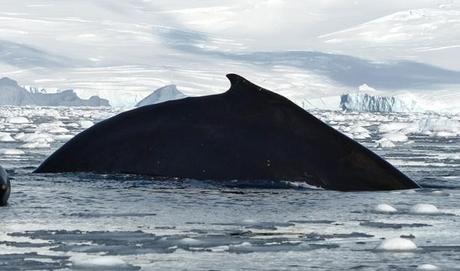
Speaking of juggernauts…
No, it wasn’t necessarily the quantity of his marathons that attracted my attention; it was their quality. Because Paul may be, without exaggeration, the most efficient marathoner in the history of the sport. His pre-Antarctica total of 56 marathons incorporated all 50 states plus Washington D.C., as well as six different continents. He’s never run two marathons in the same state nor — aside from North America — on the same continent. He’s run his hometown Philadelphia Marathon only once (although he has competed at shorter distances in the city). Unlike the rest of us, he doesn’t choose a marathon based on what his friends are running, or its proximity to his home, or because he’s easy prey for modern-day race organizers who promise a one-of-a-kind finisher’s medal to anyone who completes all three races within a series.
So it was that on the morning of March 30, only 26.2 miles in Antarctica stood between Paul and a résumé that would make even the most dehydrated marathoner salivate: membership in both the 50 States Marathon Club and the Seven Continents Club, as well as one of the more compelling personal stories in a sport rife with fascinating characters and amazing accomplishments. Antarctica would appropriately serve as the coup de grâce to his marathoning career.
At least, that was the plan. But as we all quickly learned on the Last Continent, sometimes the best-laid plans of ice and men…
Paul’s own best-laid plans went awry at mile 20 when, with 6.2 miles to go in a 15-year journey, his Antarctica Marathon came to a premature end. And four days later, on the Vavilov’s stomach-churning return voyage across the Drake Passage, as most passengers struggled with the concept of “upright,” I seized the opportunity to chat with him in the ship’s library, to learn more about his meticulously executed racing past, his unexpectedly bittersweet present, and his uncertain post-Antarctica future. I’ll let him fill in the details.
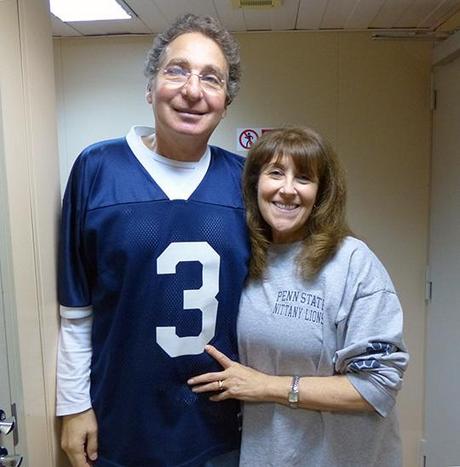
Paul and Sharon Butler, aboard the Akademik Sergey Vavilov
(The following conversation took place on April 3, 2013; the original transcript has been edited for brevity and clarity)
Mike S: What motivated you to start running in the first place?
Paul B: I was a runner in elementary school, in the 5th and 6th grade, and then I gave it up until I was in the Army, in Germany. I was married with three children, and I wanted to get myself into shape and be job-worthy before I came back home to the States and looked for a job. So my wife Sharon and I started jogging around the American base in Germany. We both lost about 40 pounds and got back in 1980 in great shape.
MS: So you came back from Germany and settled down in Philadelphia?
PB: Yes. And then sort of forgot about running until my youngest son was going to be bar mitzhvahed. In our congregation, you then do something charitable. I got something in the mail from the Leukemia Society — you raise money, and they’ll pay your way to a marathon. So I chose the inaugural Rock ‘n’ Roll Marathon in San Diego in June 1998.
We sent out letters to raise money, and our whole family went — the six of us, Sharon and I and our four children. I think we raised about four or five thousand dollars for the Leukemia Society.
That got me hooked, to do a marathon. And I was disappointed – I think I did it in 5 hours 45 minutes. I expected to finish, but I developed blisters. So then after that was over, and I was disappointed in my time, I said “I’m going to try this again somewhere. Hey, there’s one in Las Vegas, let’s go to Las Vegas.” And I actually finished that in under 5 hours, like 4 hours and 59 minutes. I really ran hard at the end and all my muscles spasmed, and Sharon had to take me back to the hotel room in a wheelchair. That’s how horrible it was.
So then I decided, I like doing all this stuff but I’m not going to kill myself anymore, I’m just going to finish. I had 3,600 frequent flyer miles built up from my credit card, and I took all six of us to Vermont. And I ran pretty good, just missed five hours by under a minute.
And we said, let’s go to some different places, doing these marathon things. When I got to about eight or nine, I saw something about the 50 States Marathon Club. That got me really motivated, and I ran over 40 marathons between 2002 and 2009. Sometimes I did 12 a year, and one time I ran two marathons on consecutive weekends.
So that’s what I did — I decided just to finish, not to hurt myself, not to worry about whether I finished in five hours or seven hours. And I just kept doing them.
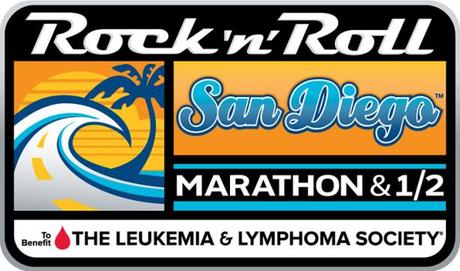
San Diego, 1998: the race that began a 15-year marathoning journey
MS: And always used your running as a reason to travel with the family and visit another state?
PB: Well, the kids went with us to Vermont and then to Alaska — the Mayor’s Midnight Sun Marathon in Anchorage in June. We made it a family vacation where we did the marathon first and then flew up to Barrow, took the train down to Fairbanks, and did the whole thing for a couple weeks. It was great.
The trick was planning everything, because I only did one marathon in every state. My last one was supposed to be in Atlantic City. So my whole family, all my friends came out… and that year they canceled the race last minute because they didn’t have a sponsor. Luckily for me there was another race that weekend, the Asbury Park New Jersey [Relay] Marathon. I’d never been to Asbury Park, so that was a new place to see, and it was their inaugural run.
But the bad news was, there was a nor’easter that weekend — it was 40 degrees, the wind was sort of like this [indicates the lurching ship], and it was raining heavily I’d say 90% of the time. It was a horrible day to do a marathon. I wouldn’t want friends and family to come out in that weather, but a lot of them did. So a lot of my family was able to see me finish, but the odd thing was… less than a minute before I crossed the finish line, two of my kids were swinging my oldest grandson back and forth and dislocated his shoulder. So when I crossed the finish line hardly anybody was there, they were all worried about him. Luckily, a family member who’s a physician was able to reset my grandson’s arm, so everything was ok.
After that, I didn’t think about running marathons anymore until February or March 2010. I had built up a ton of frequent flyer miles to run all these places in the states, and I discovered you could fly from Philadelphia to Dublin for 20,000 miles. That was a really good bargain, since it was in October during low season. And the weekend I picked out, the Dublin Marathon was that weekend.
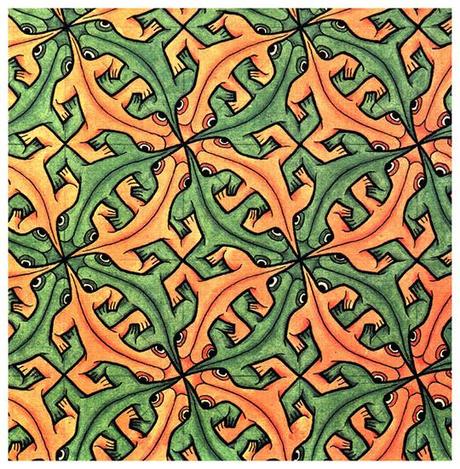
Even M.C. Escher would have been impressed by how Paul made all the pieces fit
MS: So you hadn’t thought about running the continents?
PB: No, not until that point. And I said well, I can do a marathon in Dublin. On the 50 States Marathon Club website, under “Membership” it has “Conquering the Continents.” I saw that not many people had done all the states and all the continents, and I said wow, that’d be a pretty neat thing to be one of those people.
We can’t take too much time off work, so we did several of the international races as a four-day trip — leaving on a Thursday night, arriving on Friday, sightseeing on Saturday, marathon the next morning and then leave that night. We did the same thing with Marathon Tours for their inaugural marathon in the Outback in Ayers Rock, Australia. That one had an eight-hour finishing time — that’s my kind of marathon, I always try to get the slowest. Dublin was also eight hours. So I signed up for that [Ayers Rock] and it worked out great, it was a nice marathon.
And then Phuket in Thailand — I did that in 2011, and that was the worst race ever, ever, ever. I wear orthotic inserts all day when I work and during races too, and they’d never bothered me before. But in Phuket, it was so hot and humid that I developed horrible blisters, and the orthotics kept irritating the blisters. I didn’t really know what was going on the whole race, until I got home and saw what had happened… I kept thinking there were stones in there or something. But I had blisters — I peeled the whole thing off the back of my foot, from the bottom of my foot, both feet.
The bottom line was that after about 5 miles, I was limping… and I limped the whole way, 26.2 miles. But I finished, and that was my slowest finish time, like 7 hours 15 minutes. I crossed the finish line, and I was like the last one to finish. I knew I wasn’t going back there to do it again — I had to do it. So that was gratifying, the fact that I did it.
Then I ran Mt. Kilimanjaro the following February, Easter Island in June, and the Marine Corps Marathon [in Washington D.C.] was in there at some point. And I was done last June, after Easter Island.
I signed up for Antarctica probably three years ago. I was signed up for 2014, and Thom [Gilligan, President/Founder of Marathon Tours and Antarctica Marathon race director] called me a year and a half ago to ask, “Do you want to move up a year?” Believe it or not, I trained harder for this race than I did any other race because I knew it was going to be more difficult. I like to run on a treadmill, and that was probably my downfall — even though I would run 15, 16 miles and elevate it every once in a while to get used to hills, it just wasn’t like this. You can’t duplicate this on a treadmill. [laughs] So that was probably my downfall. This was supposed to be 57 and done, and… now it isn’t. But I did get a half marathon medal, I did 20 miles, I just… I would never come back here, I would never do this again.
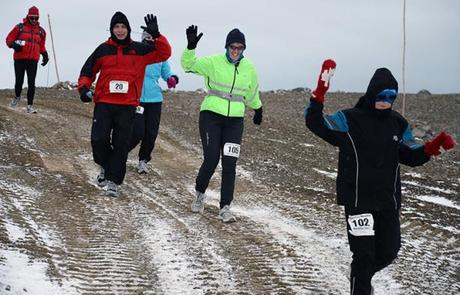
Paul (wearing bib #20) greets the camera during the Antarctica Marathon (photo credit Anita Allen)
MS: There are companies that fly into Antarctica, race immediately and fly out again. Would you ever think about doing that?
PB: I probably would… because it’s going to gnaw at me for a while, that I didn’t finish it. I can’t help it — no matter what anybody says to me, it’s going to bother me. Even though it’s the same medal, and it’s going to be up on my wall, it doesn’t mean the same in my heart. I know there are two other races that fly in here, so I would definitely do that. But we can’t really afford to do it this way [by ship] again. Our house needs to be painted, the bathroom needs to be redone, and we put that off so I could do this. Who knows, I’m only 61, there are a lot of guys here older than me who finished a marathon, so… I’ll see.
MS: So then what’s next? Will you keep running, maybe start over?
PB: Well, I’m going to still run, but I have no marathons planned. I signed up for the Broad Street Run in May — Philadelphia has a Broad Street 10-mile run which is the best, most successful and most popular 10-miler. They have like 40,000 runners, and it’s a lottery like the New York City Marathon. It’s a nice easy run, and I’ll do that. And then I’ll see. I’ll look into… I know I’m not going to not look at the website for those two other [Antarctica] marathons. But I have to find out, is there a time limit on that one? I don’t want to go there and get yanked off the course in 6 hours 15 minutes if they’re only giving you six hours.
I’ve been emailing my daughter, who’s a professional trainer. She’s done a couple marathons with me in Hawaii and Florida, and she was a professional basketball player. When she was in high school, in the state semifinal game, her team was behind by two, and as the point guard she was dribbling down court for the tying or winning basket with five seconds left. She was dribbling down, and the ball dribbled off her knee, went out of bounds, and that was the end of her high school career. She said, “Dad, that haunts me all the time.” Not every day — she has three boys of her own now, she’s got a nice life, great husband, but every once in a while she thinks about that ball dribbling off her foot, just like I’m going to think about me stopping at the 20-mile mark and not finishing this race. She says things happen: “You know, whatever caused you not to have the energy to go on, it happened. Just like I dribbled off my foot, I can’t go back to change it.” Like the guy who makes the last out in the World Series, you know, or the guy who drops a perfect pass in football.
MS: So you decided to stop the Antarctica race yourself, you said?
PB: Yes, it was my choice. I guess I looked ok, and Thom said “Paul, I’m stopping all the runners after you, and we’re going to monitor you.” I was on that harder loop [out to the Uruguayan base and back] at the 20-mile mark, and I saw a hill. At the 20-mile marker there was a big dip right there, and I had already fallen twice, I’d really hurt myself [indicates his wrist].
I said to myself, I’m going to fall if I try to go over that hill, and I’m never going to get back up to go the other way. And there were still hills beyond that. I just felt that I was going to hurt myself. I’d already fallen twice, and I didn’t want to really cause any problem for me or anybody else getting me out of there. I just didn’t feel confident… I lost my confidence. Because I wasn’t out of breath, I just didn’t have the inner strength.
MS: So… you mentioned Phuket, but would this qualify as your most challenging race?
PB: The course in Phuket wasn’t crazy hard, it was just the feet that got me in trouble there. I never professed to be a great marathon runner, but this is the first I had to drop out of. I always finished every race — even if I had to walk it, I always had that strength to finish. This one just… like I said, I trained for this one more than any other marathon, and I didn’t take it seriously enough, even at that point when Thom sent that email about “You’d better train for the hills.” The ice and the hills just got to me.
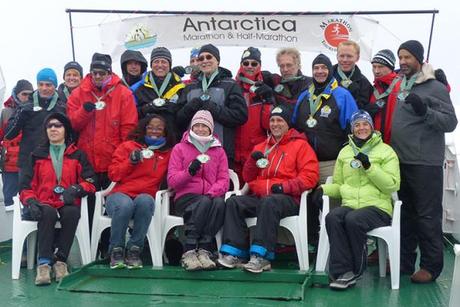
For 18 runners, crossing the finish line in Antarctica secured their place in the Seven Continents Club
MS: Do you have a most memorable race?
PB: I like Vermont because it was a tough course that I finished pretty well, for me — a little over five hours. Actually, that was a beautiful course. Marine Corps I liked also because I did a pretty good time on that, and once you do that, you feel like you’re a real Marine, you know? [laughs] Every race I felt really good about because I’m not a super athlete. I’m sure I’m 20 pounds overweight. In my mind it’s hard to even walk a marathon, and I usually would run more than half of it, then run and walk the rest of the way.
But I always felt that I was able to pick my races. I couldn’t pick this one, this was it — this was the one, I couldn’t change it. I always thought I could do what I had to do with this one. Because I talked to a few people who had done it, and they said “Thom will let you finish as long as he sees you’re going at a good pace.” And he did… he was going to allow me to finish. I made the choice to stop. And that’s not like me.
Bob [a fellow runner] picked me up when I fell. He saw me go down the second time, and I didn’t get up right away. I wasn’t knocked out, but I was like in shock, like where am I? He yanked me up and asked me if I was ok, and I said yeah I’m fine, and I kept on going at that point.
MS: What’s been your favorite destination, not necessarily for the race itself, just a place you visited?
PB: Actually, believe it or not, Mount Rushmore. There’s actually two marathons there, Mt. Rushmore and Crazy Horse [MS note: the Mt. Rushmore Marathon was discontinued after 2008]. I chose the Crazy Horse Marathon because it’s more downhill. If I can go fast on the first half — I usually walk a lot of the second half — I’ll finish in a good amount of time. I love that course, and Sharon loved to see Mt. Rushmore.
These races have given us chances to see the whole country. When we went to do the Lake Okoboji Marathon in Iowa, we took a three-hour side trip and saw the Field of Dreams, from the movie. Every time we went somewhere we tried to see an attraction. Even if we had to drive a long distance it was worth it, because you never know when you’re going to go back to these places.
MS: What’s your PR?
PB: It’s like 4:59:02 I think, something like that. That was in Las Vegas. I figure there’s no way I’m ever going to get under four hours, so that’s fine for me.
MS: Have you run any trail races, or do you stick to roads?
PB: No, I don’t do any… in fact, I would consider this a trail race, I think it should be advertised as a trail race. Whether it’s muddy or icy, it’s still a trail race.
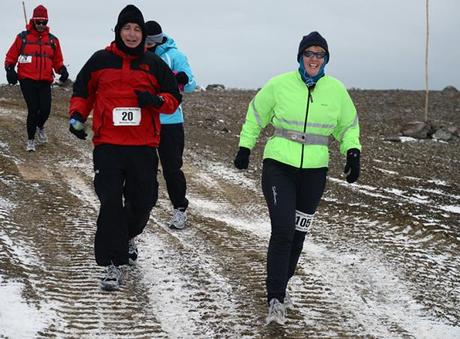
This definitely has the look of a trail race (photo credit Anita Allen)
MS: Do you run any other distances?
PB: I’ve done the Broad Street Run many times, the 10-mile one, and I do a few half marathons in Philadelphia. But not much lately. I really just tried to do marathons, and now it’s a new part of my life, so I haven’t really figured out what I’m going to do next.
MS: Do you do any other sports besides running?
PB: I played basketball with an adult league for ten years. When I decided to do this running thing I gave it up, because in this league guys like you – younger guys – would come in and play, and they would play for real real. I was scared I was going to get hurt… so I decided just to make sure if I was going to hurt, I was going to hurt myself [running]. So I might try that, I might go back and do the basketball thing.
MS: Have you sustained any injuries through all of this?
PB: Yes, this happened about two months ago — I switched shoes, I didn’t do it right away, but I did a 15-mile run, and after the run this big toe got totally black. I had to go to this podiatrist who saved me many times in my running career. He gave me some shot and had to slice between the nail and the thing, and the thing bled out. I was able to still run, and it finally eased up, but that sidelined me for a couple weeks about eight weeks ago. So that’s the worst of my injuries.
MS: Wow, so no shin splints, no stress fractures, no tendinitis, no plantar fasciitis, nothing too serious?
PB: I did… in 2001 I had a problem with plantar fasciitis, and I didn’t run for about a year. I must have bought three or four different gadgets to try to cure that, and the orthotics finally helped. That was all my injuries. It wasn’t all easy, but I never had knee problems, I never had shin splints, never really had hip problems.
Yeah, I was pretty fortunate. And I always say to myself that if I could lose 20 pounds and keep it off forever, I probably would’ve been a really good runner. Because I had no knee injuries, no problems — but I didn’t have the self-control, I enjoy eating too much. I’m a vegan, but I eat a lot of that too.
MS: If you were to start on day one and do this all over again, would you do it the same way? Would you do anything differently?
PB: For my whole running career?
MS: Yes, from San Diego, 1998.
PB: No, it was such a great run. I spent so many hours planning to make sure I could get all the states at a certain time to finish up Saturday [in Antarctica]. It was all planned out, and it took so much effort — enjoyable effort. It was a good part of my life, 15 years. And who knows what the future’s going to bring. I swore to everybody this was going to be my last marathon… I said “This is it, I’m not doing anymore.” It takes up a lot of time; I wake up at 4:00 in the morning on the treadmill, I’m running two hours before I go to work, and then I’m falling asleep at 7:00 at night. I know if I were to say to Sharon right now, “Let’s not paint the house, let’s not fix this,” then she would go with me, she would do this again… she would. But it’s not fair. She’s given up enough at this point, and she was at every finish line, every finish line.
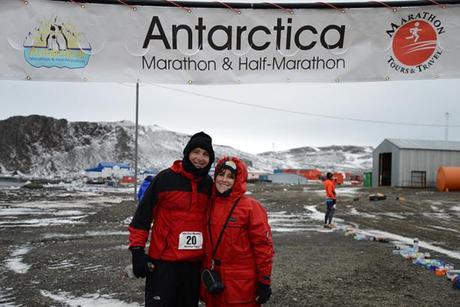
Reunited at the finish: while Paul raced, Sharon provided support as a volunteer (photo credit Anita Allen)
MS: As far as advice for other runners who look at you and say, “Wow, 56 marathons, I couldn’t even run one,” or really anybody who’s looking at some kind of daunting challenge, would you have any guidance for them?
PB: Yes, I would. I think anybody could do it, could do what I did. I don’t consider myself a great athlete. But I bought this book called The Non-Runner’s Marathon Trainer, written by two professors from the University of Northern Iowa who taught a course about training for a marathon as part of their college curriculum. It was a 16-week course, and they gave you eating advice and training advice so that any non-athlete could get through a marathon. So I read and followed the training guidelines in that book for the first three or four marathons. And it worked. So anybody who’s not a real athlete, buy that book.
MS: Is there any other race that you really want to run, that you have in mind?
PB: No, there’s a whole bunch of stuff that’s going on in my life right now. But I’ll be thinking about Antarctica… definitely that’s going to be on my mind, and who knows what’s going to happen.
